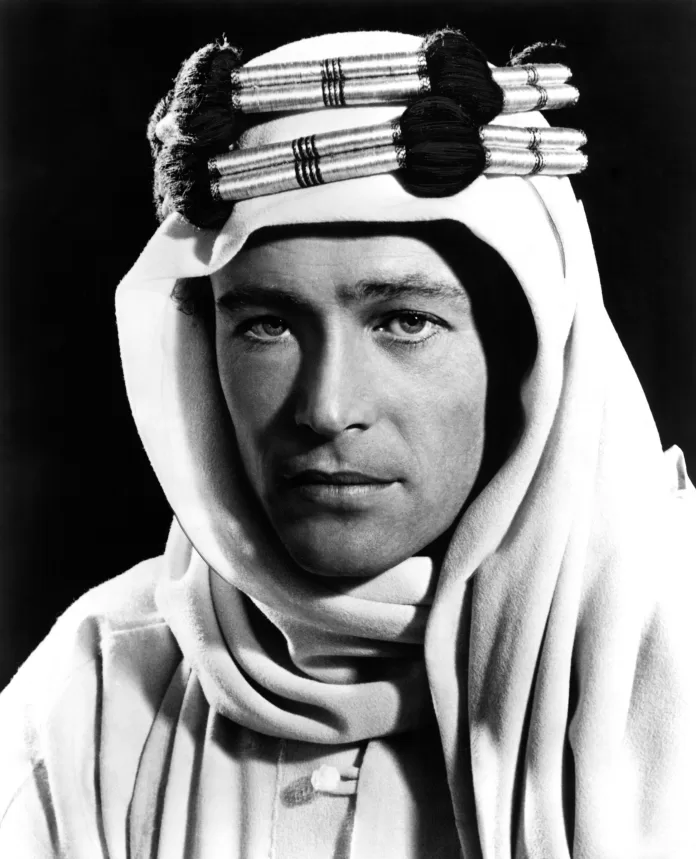A young teenager wrote in his diary; “I’ll not be a common man. I will stir the smooth sands of monotony”. His name was Peter O’Toole and by 1962, he surely was not a common man just like the character of T.E. Lawrence that he played. O’Toole died on December 14, 2013. He is known for his lead role in the epic movie Lawrence of Arabia. This movie is an all times classic and inspired many including director Steven Spielberg and actor Tom Cruise. A lot has been written about the legendry T. E. Lawrence; more than any other military or political figure of the First World War. Lawrence has his admirers and critics and he is at the same time a hero and a villain. Arabs view the legacy of Lawrence with mixed feelings. Lawrence wrote about the dilemma of the Arabs in one single sentence that ‘the fringes of their deserts were strewn with broken faiths’. He can be cast as a scholar, a warrior, an imperial pawn, a master manipulator, a true friend of Arabs, the betrayer of Arabs, an epic hero of his times, a gentle soul, a sensitive gentleman or a sexual deviant. It was no surprise that the movie also generated a lot of controversy.
Filming of Lawrence of Arabia is an interesting saga and story is summarized by Karl Meyer and Shareen Blair Brysac in The King Makers. When Lawrence published Revolt in the Desert in 1927, he was approached by Hollywood director Rex Ingram but Lawrence declined. In 1934, British filmmaker Alexander Korda bought the movie rights of the Revolt of the Desert but on the request of Lawrence shelved the project in January 1935. Lawrence died in a motor cycle accident in May 1935 and his tragic death rekindled the movie project. However, reservations of the British government and concerns about reaction of Arabs and Turks prevented concrete work. In 1950s, movie rights were acquired by Arthur Rank and he chose Alec Guinness for the lead role. However, project was shelved again due to Suez Crisis of 1956 and 1958 coup and killing of Iraqi royal family. Hollywood producer Sam Spiegel acquired movie rights and movie became a joint American and British venture. Initially, the role was offered to Marlon Brando but he declined. The second candidate Albert Finney (class mate of O’Toole at Royal Academy of Dramatic Arts) also declined and luck smiled on a little known stage actor Peter O’Toole. The rest as they say is history.
Film was completed in two years with a budget of $15 million. Movie was filmed on locations in Jordan, Morocco and Spain. Laurence Olivier was selected for the role of Prince Feisal but when he dropped out it went to Alec Guinness. Omar Sharif was selected to play the role of Amir Ali when producers were unsuccessful with four actors. Sharif was class fellow of famous academic Edward Said and his role in the film introduced him to Hollywood. Later, he played lead roles in many famous movies. The role of Jackson Bentley was initially offered to Kirk Douglas but when he demanded a star salary, Arthur Kennedy was selected for the role. Famous Puerto Rican actor Jose Ferrer was casted for the role of the Turkish Bey. Jose was already a celebrity with three Academy Award nominations and winning the best actor award in 1950. He only agreed to play this minor role after negotiating a salary that was more than the combined salary of Peter O’Toole and Omar Sharif and a custom made Porsche car. Anthony Quinn played the role of Auda Abu Tay. Several minor roles were played by an international cast with Egyptian actor Gamil Ratib as Majid, Spanish actor Fernando Sancho as Turkish sergeant, Indian actor I.S. Johar as Qasim and Pakistani actor Zia Mohiuddin as Tafas.
Queen Elizabeth II attended the London premier of the movie in 1962. Film was an instant hit and phenomenon was global. Film was nominated for ten and won seven Oscars. O’Toole lost the best actor award to Gregory Peck for his role in To Kill a Mockingbird. O’Toole would make another record in his career for eight Oscar nominations but never winning it.
Lawrence evokes strong sentiments a century after his adventures although even he acknowledged that Arab revolt was a ‘sideshow of a sideshow. O’Toole gave an unforgettable face to the legend of Lawrence for the later generations. Film producer was not off the mark when after a four hour initial trial of O’Toole, he remarked ‘we have found the Lawrence’. The character and actor had many similarities and both lived a life on the edge right in between self destruction and self preservation. Lawrence loved racing his motorcycle that ultimately took his life. O’Toole had a drinking problem and he admitted that “Booze is the most outrageous of all drugs, which is why I chose it”. Lawrence and O’Toole declined knighthood for personal and political reasons. O’Toole introduced legendry T. E. Lawrence to a worldwide audience for his memorable role and in return Lawrence immortalized O’Toole.
Notes
Karl E. Meyer & Shareen Blair Brysac. King Makers: the Invention of the Modern Middle East (New York: W. W. Norton & Company, 2008)
Robert Sellers. Hellraisers. (New York: St. Martin’s Press, 2009)





